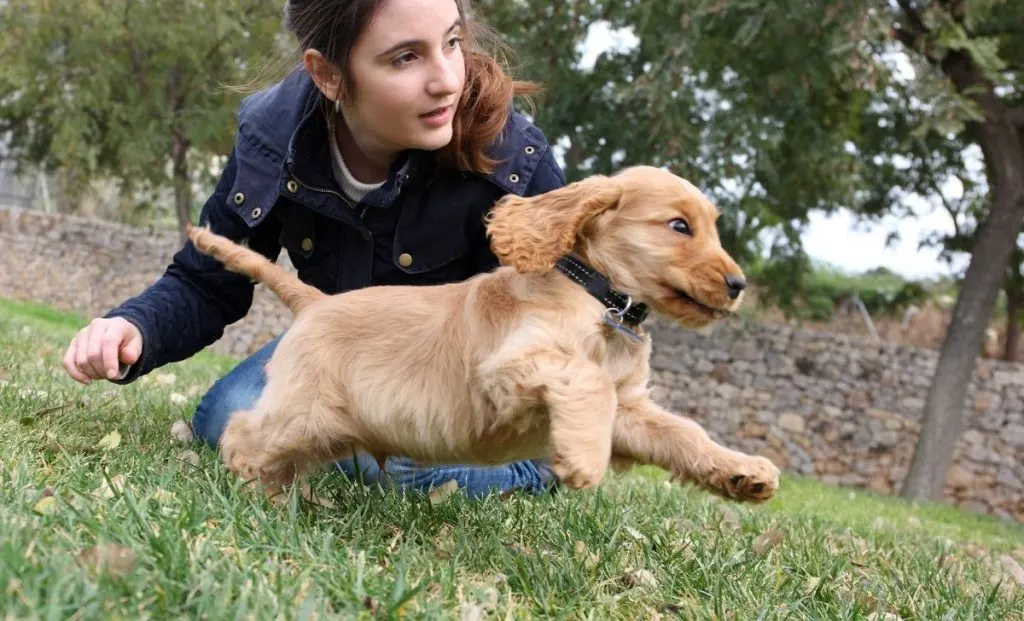Our dogs are like babies to most of us. We love and adore them with all our hearts! So, when I caught myself wondering, Why is my Cocker Spaniel shaking all of a sudden?, it’s easy to guess that I immediately entered panic mode.
Seeing our beloved pets trembling when we don’t know the reason can be extremely scary. Many of us will immediately suspect that our pooch is afraid of something or even that there’s some underlying medical condition.
But what is the truth, and what are some of the most common causes of shivering in Cocker Spaniels? Let’s find out!
1. Excitement

While I was frantically asking my vet Why is my Cocker Spaniel shaking?, one of the first things she explained was that not all the reasons behind this behavior are bad.
For example, one of the most common reasons why your canine companion might be shaking is excitement.
Yes, you’ve read that correctly – your pooch might be shaking because he is so happy that he cannot control this intense emotion he is feeling!
While shaking is not one of the most well-known signs that your pup is happy, most dog owners have witnessed their four-legged friends trembling and making a dance-like move while awaiting treats, pets, or even walks.
Isn’t it adorable?
2. Cold Weather
Cocker Spaniels have long, curly coats that typically keep them warm during cold weather. However, if the winter is really bad, or if you’ve been walking your little diva in the snow or rain for too long, even a Cocker Spaniel might start quivering.
Try not to get your Cocker Spaniel out too much when the weather is too harsh. If you notice him being too sensitive to the weather, consider getting him a cute dog sweater or even socks so he can stay warm in the snow.
3. Stress

Shaking is a common symptom of stress, anxiety, and fear. You’ll notice your pup’s whole body trembling, as well as some other signs of stress, such as tail tucked between legs, defensive stance, and widened eyes.
Maybe you have a dog that was abused by a previous owner, or your pup is struggling with separation anxiety when you leave the house. Either way, try to discover what is triggering your pup to enter a shaking state.
Sometimes, your dog might be stressed out by seemingly ordinary things, such as a vacuum cleaner or a new toy. Still, if you notice your pup being anxious all the time, it might be a good idea to contact a behaviorist or a dog specialist.
4. Pain
Another reason behind a shaky dog’s behavior is pain.
If a Cocker is in too much pain, he will shake uncontrollably. You might notice some other symptoms, such as limping, whining, or even aggression.
Considering how Cockers are calm and social dogs if you notice them shaking while expressing violent tendencies, chances are something is hurting them.
The best option here would be to take your pooch to an emergency vet. Don’t try to feel your pup to determine whether a specific region is hurting him. You are risking your dog biting you out of pain and fear. The veterinarian is the safest option.
5. Old Age

If you notice your old Cocker Spaniel has started shaking recently, this might simply be something that comes with old age.
Senior Cocker Spaniels will experience muscle weakness at a certain age, as well as some health problems associated with growing old.
Not only that, but senior doggies are generally more sensitive to cold nights, as they are having a hard time regulating body temperature. This, too, can cause shaking.
The only thing you can do to help your pup is to take him to a vet to make sure he isn’t in pain. If he is struggling, he might be prescribed some medications that will help him live more comfortably.
As long as your four-legged friend isn’t hurting, he can continue to live his life normally, even though he might seem to be a bit wobbly on his feet.
6. Medical Reasons
There are also a few health issues that might cause head shaking in dogs. A few things can also cause his whole body to shake!
It’s important to distinguish seizure disorders from health conditions such as hypoglycemia that cause body shaking. Some signs of a seizure include:
- Loss of consciousness
- Foaming at the mouth
- Shaking, jerking, and twitching
- Lose control of body functions, such as urinating or defecating
- Body stiffening
On the other hand, a Cocker Spaniel that is shaking will still be conscious and respond to your commands.
Some of the health problems that might cause shaking include:
- Poisoning
- Hypoglycemia
- Shaker syndrome
- Kidney disease
- Arthritis
If you suspect your pup is struggling with a certain health problem, don’t try to diagnose him on your own. Instead, get him to a local vet as quickly as possible.
Fortunately, Cocker Spaniels are generally healthy dogs that have only a few common health issues. Still, it’s always better to stay safe than sorry, so if you suspect anything is out of the ordinary, make sure to contact a professional.
7. Attention Seeking

Finally, think about how you’re responding when you see your Cocker shaking. Are you running to see what’s wrong the moment the trembling starts? Maybe you are giving your pup positive reinforcement and actually teaching your pup bad behavior.
Our Cocker Spaniels thrive on attention. They’ll do anything they can to have you spend some time with them!
Chances are, every time your pup shakes, you call his name or come towards him to check up on him. Over time, your pup learns that if he starts shaking, he’ll get your care.
Cocker Spaniels are quite intelligent dogs, and they can learn this behavior rather quickly. It can be tricky to differentiate such behavior from serious reasons behind shakiness.
The best way to stay on the safe side is to take your pup to the vet. Is everything alright with him healthwise? The weather is warm, and he doesn’t have any other signs of stress? Chances are he is faking it for the sake of attention.
If this is the case, just try to ignore him whenever he is quivering. Don’t yell at him, and don’t scold him, as all of this can be considered a positive response. This should be enough to teach him that he won’t gain anything by faking shakiness.
So, why is my Cocker Spaniel shaking and is this a reason for concern?
No matter the cause of shaky behavior in your beloved pet, the best course of action would be to monitor his behavior for a while. If the shakiness is too excessive, or if it lasts for more than a few hours, take him to your vet to rule out any health concerns.
Most of the time, shakiness is nothing to be worried about. Still, it’s better to be safe than sorry. A veterinarian or a dog specialist might give you a better inside look into this dog’s behavior and advise you on the best course of action.
Good luck!

Vanja’s passion for writing started at an early age, which is why she pursued Journalism as her college degree. She can research any topic and find all the information before you bat an eye, which is a great thing for her job but a terrible one for her husband.
Even as a young child, she fell in love with everything fluffy – but dogs have a special place in her heart due to her childhood companion, a Corgie named Archie.
Motivated by her experiences and driven by a desire to give back to her four-legged companions, she spends her free time volunteering at a local dog shelter.
